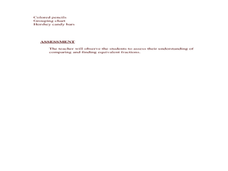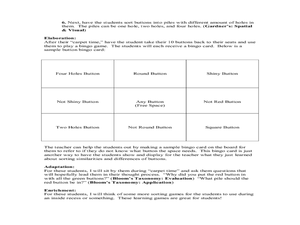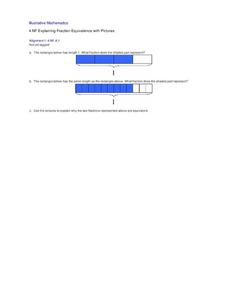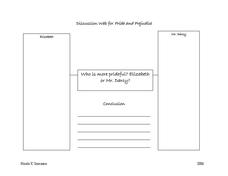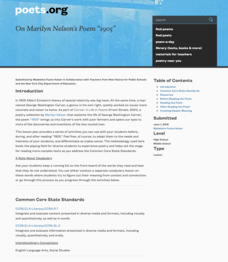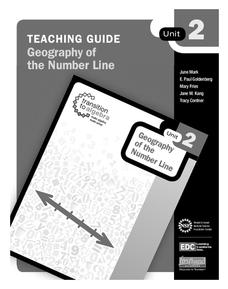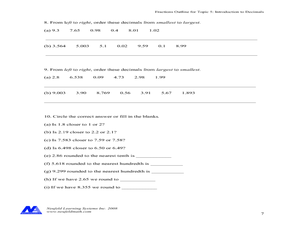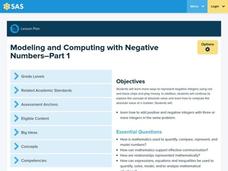Curated OER
Can You Name That Shape?
Learners use materials to build, investigate, and draw two-dimensional shapes (polygons). They combine the shapes they have built and draw from the pile to begin a round-robin activity to name and determine the attributes of a selection...
Curated OER
Hershey Bar Equivalent Fractions
Fourth and fifth graders explain how to use equivalent fractions. They recognize which fractions are equivalent. Pupils find equivalent fractions.
Curated OER
Grouping Buttons
Looking for a good activity on counting and sorting? This activity is worth a look! In this classification activity, learners sort buttons by color, shape, shiny verses not shiny, or number of holes.
August House
Go to Sleep, Gecko
Use this multidisciplinary lesson to delve into these subjects: English language arts, math, science, drama, and character education. After reading, discussing, and making interpretations about Go To Sleep, Gecko!: A Balinese Folktale by...
EngageNY
Grade 5 Math Module 1, Topic F, Lesson 13
After completing a fluency practice set on subtracting, multiplying, and comparing decimals, pupils begin learning about dividing decimals by whole numbers. They see how to use place value reasoning to find compatible numbers for...
Curated OER
Indiana Applied Skills Assessment Sample
In this Applied Skills Assessment worksheet, 5th graders complete a sample state assessment for Language Arts and Mathematics for 5th graders. They read a writing prompt and complete a writing activity that follows, answer various types...
Illustrative Mathematics
Explaining Fraction Equivalence with Picture
Visual models are a great tool for demonstrating the concept of equivalent fractions. Given two pictures, young mathematicians first identify each fraction and then write an explanation for why they are equivalent. Use as a guided...
Curated OER
Pride and Prejudice: Discussion Web
Both Elizabeth and Mr. Darcy have proud moments, but who is more prideful? Explore Jane Austen's Pride and Prejudice with a discussion web that compares both characters in a brainstorming graphic organizer. Each side provides enough...
Nuffield Foundation
Investigating the Effect of Concentration of Blackcurrant Squash on Osmosis in Chipped Potatoes
Model and explore osmosis using squash and potatoes. Young scientists expose chunks of potatoes to different concentrations of a squash solution. They compare the weights of the chunks before and after exposure to the solution and use...
PBS
Decoding Media Bias
Alternative facts? After watching the We The Voters film, "MediOcracy," viewers compare how cable news outlets CNN, Fox News, and MSNBC report the same story about politics or public policy. After a whole-class discussion of their...
Academy of American Poets
On Marilyn Nelson's Poem “1905”
Marilyn Nelson's poem, "1905," asks young scholars to compare and contrast George Washington Carver and Albert Einstein. After studying images of the two scientists and listing their observations, class members listen to several readings...
ReadWriteThink
What is Poetry? Contrasting Poetry and Prose
Introduce middle schoolers to the different strategies used when reading prose versus poetry. Groups use a Venn diagram and a poetry analysis handout to compare the characteristics of an informational text and a poem on the same subject...
Education Development Center
Geography of the Number Line
It's more than just numbers on a line, its an organizational, mental math machine to help learners understand the value of numbers. The tool is handy when introducing positive and negative integers to see their values and relationships....
Education Development Center
Micro-Geography of the Number Line
Young mathematicians dive into the number line to discover decimals and how the numbers infinitely get smaller in between. They click the zoom button a few times and learn that the number line doesn't just stop at integers. Includes a...
Pace University
Urban Communities
Urban communities are the focus of a series of lessons created to meet specific needs using differentiated instruction. A pre-assessment designates scholars into three groups based on their ability level. Small groups take part in...
ReadWriteThink
Captioning the Civil Rights Movement: Reading the Images, Writing the Words
Scholars boost their knowledge of the Civil Rights Movement with a lesson that challenges writers, readers, and historians to analyze primary sources and caption their observations. By way of reading, writing, discussion, independently,...
Nebraska Department of Education
Work: Love It or Hate It?
Future job seekers interview adults who love their work and ones that dislike their work. After reflecting on what they learned in a whole-class discussion, participants create a mission statement that details what they want and don't...
Curated OER
Students' Strides
Complete problems using base ten blocks to see the difference in the place value of a decimal and how it affects a number's value. Learners compare decimal values as well. Ample time for discussion and modeling are allowed in the...
Curated OER
Building Sets of 13 and 14
Compose and decompose sets of 13 and 14 and compare sets of each with your little learners. They use objects to construct sets of 13 and 14, record their answers, and compare sets in several different ways.
Curated OER
Introduction to Equivalent Fractions
Explore equivalent fractions! Youngters measure the crown of their head with adding tape labeled with various fractions and fractional parts, and compare strips to notice numerical relationships. They fold adding tape in half and color...
Curated OER
Exploring Roman Numerals
Students investigate the values of a variety of Roman Numerals and compare and contrast the patterns with Arabic numbers. The application, "Numerus" is utilized to lead students through the lesson.
Curated OER
Introduction to Decimals
Young math whizzes complete the online instruction, then solve 20 problems about identifying decimals, comparing decimals and fractions and ordering decimals.
Curated OER
Dividing with Fractions
Use paper strips or models to relate division problems to division of fraction problems. Since the materials can be broken up, it helps them to show how they can complete repeated subtraction with fractions and not just whole numbers.
Curated OER
Growing Minds: My Plate
Examine food choices and the nutritional properties of food groups with this visually appealing whole-class lesson plan. This will take a bit of preparation, but once you do it, you can use the materials for years. Using a food groups...
Other popular searches
- Compare Numbers to 20
- Compare Numbers to 999
- Compare Numbers Lesson Plans
- Compare Numbers to 1000
- Compare Numbers 1 10
- Estimate and Compare Numbers
- Compare Numbers 1 5
- Compare Numbers 1 20
- Compare Four Digit Numbers
- Order and Compare Numbers
- Compare Numbers to 10
- Math Compare Numbers



